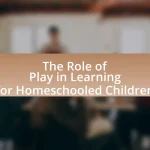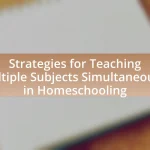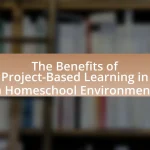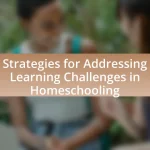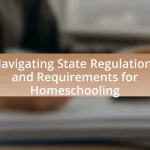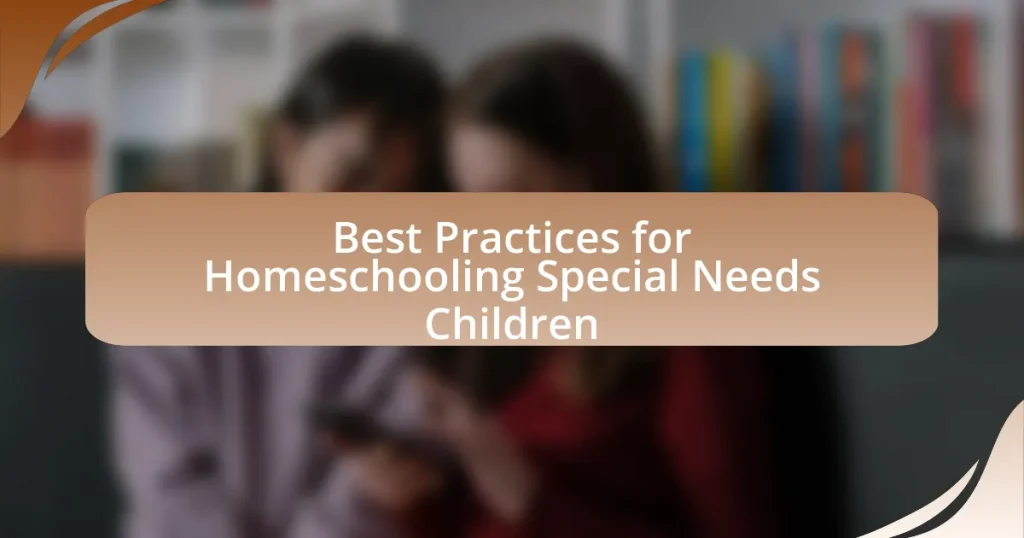The article focuses on best practices for homeschooling special needs children, emphasizing the importance of individualized education plans (IEPs), structured routines, and multisensory learning techniques. It outlines methods for parents to identify their child’s unique needs through assessments and observations, and discusses how individual learning styles influence the homeschooling approach. Key components of an effective curriculum, strategies for creating a supportive learning environment, and resources available for parents are also highlighted. Additionally, the article addresses challenges faced in homeschooling special needs children, including socialization concerns and emotional and behavioral challenges, while providing practical tips for enhancing the homeschooling experience.
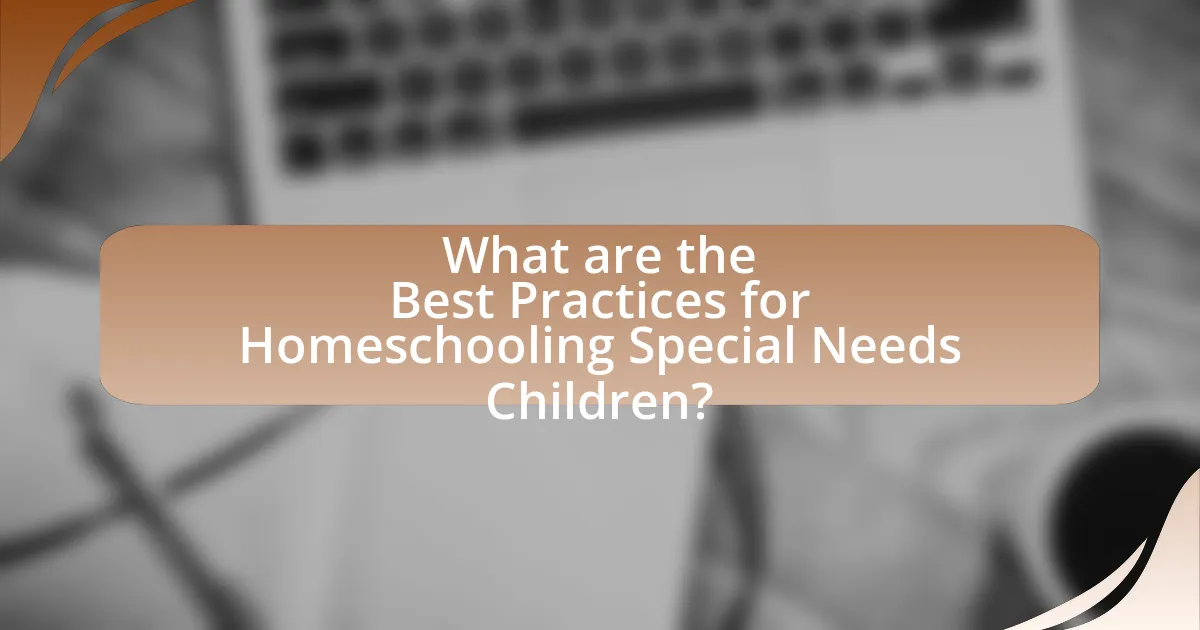
What are the Best Practices for Homeschooling Special Needs Children?
The best practices for homeschooling special needs children include individualized education plans (IEPs), structured routines, and incorporating multisensory learning techniques. Individualized education plans allow parents to tailor the curriculum to meet their child’s specific needs, ensuring that learning objectives are aligned with their abilities. Structured routines provide consistency, which can help children with special needs feel secure and focused, enhancing their learning experience. Multisensory learning techniques engage multiple senses, making lessons more accessible and enjoyable, which is supported by research indicating that children with special needs often benefit from varied instructional methods.
How can parents identify the unique needs of their special needs children?
Parents can identify the unique needs of their special needs children by conducting thorough assessments and observations. These assessments can include standardized tests, developmental screenings, and evaluations by professionals such as psychologists or special education teachers. Observing the child’s behavior, communication patterns, and learning styles in various settings also provides valuable insights into their specific needs. Research indicates that individualized education plans (IEPs) are effective tools for tailoring educational approaches to meet the unique requirements of each child, ensuring that their specific challenges and strengths are addressed.
What assessments can help determine a child’s learning style?
Assessments that can help determine a child’s learning style include the VARK Questionnaire, Learning Styles Inventory, and Gardner’s Multiple Intelligences Assessment. The VARK Questionnaire identifies preferences for visual, auditory, reading/writing, and kinesthetic learning modalities, providing insights into how a child best absorbs information. The Learning Styles Inventory categorizes learners into distinct styles, such as visual, auditory, and tactile, helping educators tailor their approaches. Gardner’s Multiple Intelligences Assessment evaluates a child’s strengths across various intelligences, such as linguistic, logical-mathematical, and interpersonal, which can inform personalized learning strategies. These assessments are widely recognized in educational psychology for their effectiveness in identifying learning preferences.
How do individual needs influence the homeschooling approach?
Individual needs significantly influence the homeschooling approach by dictating the curriculum, teaching methods, and pace of learning tailored to each child. For instance, children with learning disabilities may require specialized resources and individualized lesson plans that accommodate their unique challenges, such as using multi-sensory learning techniques or assistive technology. Research indicates that personalized education strategies can enhance engagement and retention, as evidenced by a study published in the Journal of Special Education, which found that individualized instruction improved academic outcomes for students with special needs. Thus, recognizing and addressing individual needs is essential for effective homeschooling practices.
What are the key components of an effective homeschooling curriculum for special needs children?
An effective homeschooling curriculum for special needs children includes individualized education plans (IEPs), multisensory learning approaches, flexible pacing, and ongoing assessment. Individualized education plans ensure that the curriculum is tailored to meet the specific needs and goals of each child, which is crucial for their development. Multisensory learning approaches engage various senses, enhancing understanding and retention of information, as supported by research indicating that children with special needs benefit from diverse learning modalities. Flexible pacing allows children to progress at their own speed, accommodating their unique learning styles and challenges. Ongoing assessment provides feedback to adjust teaching strategies and curriculum content, ensuring that educational objectives are being met effectively.
How can parents select appropriate educational materials?
Parents can select appropriate educational materials by evaluating the specific learning needs and preferences of their child. This involves assessing the child’s strengths, weaknesses, and interests to ensure that the materials align with their unique learning style. Research indicates that tailored educational resources can significantly enhance engagement and retention in special needs education. For instance, the National Center for Learning Disabilities emphasizes the importance of using multisensory materials that cater to various learning modalities, such as visual, auditory, and kinesthetic approaches. By prioritizing these factors, parents can effectively choose resources that support their child’s educational journey.
What role does flexibility play in curriculum design?
Flexibility in curriculum design is essential for accommodating the diverse learning needs of special needs children. It allows educators to tailor instructional methods, pacing, and content to fit individual student requirements, thereby enhancing engagement and effectiveness. Research indicates that personalized learning approaches, which are a hallmark of flexible curriculum design, lead to improved academic outcomes for students with disabilities. For instance, a study published in the “Journal of Special Education” found that adaptive curricula significantly increased student participation and achievement in learning activities. This adaptability ensures that educational experiences are relevant and accessible, fostering a supportive learning environment for all students.
How can parents create a supportive learning environment at home?
Parents can create a supportive learning environment at home by establishing a structured routine that includes designated study times and a quiet, organized space for learning. Research indicates that children with special needs benefit from consistency and predictability, which helps them feel secure and focused. Additionally, incorporating sensory-friendly materials and tools tailored to the child’s specific needs can enhance engagement and comprehension. For instance, using visual aids or hands-on activities can cater to different learning styles, making the educational experience more effective.
What strategies can enhance focus and minimize distractions?
To enhance focus and minimize distractions, implementing structured routines and creating a dedicated learning environment are essential strategies. Structured routines provide predictability, which can help special needs children feel secure and focused, as research indicates that consistency in daily activities improves attention spans. A dedicated learning environment, free from unnecessary stimuli, allows children to concentrate better; studies show that reducing visual and auditory distractions significantly increases task performance. Additionally, incorporating short breaks and using tools like timers can help maintain engagement and prevent burnout, further supporting sustained focus.
How can parents incorporate sensory-friendly spaces into their home?
Parents can incorporate sensory-friendly spaces into their home by designating specific areas that cater to various sensory needs. These spaces should include calming elements such as soft lighting, comfortable seating, and noise-reducing materials to minimize distractions. Additionally, incorporating sensory tools like fidget toys, weighted blankets, and textured surfaces can help children engage with their environment in a soothing manner. Research indicates that sensory-friendly environments can significantly reduce anxiety and improve focus for children with special needs, as highlighted in studies by the National Center for Learning Disabilities.
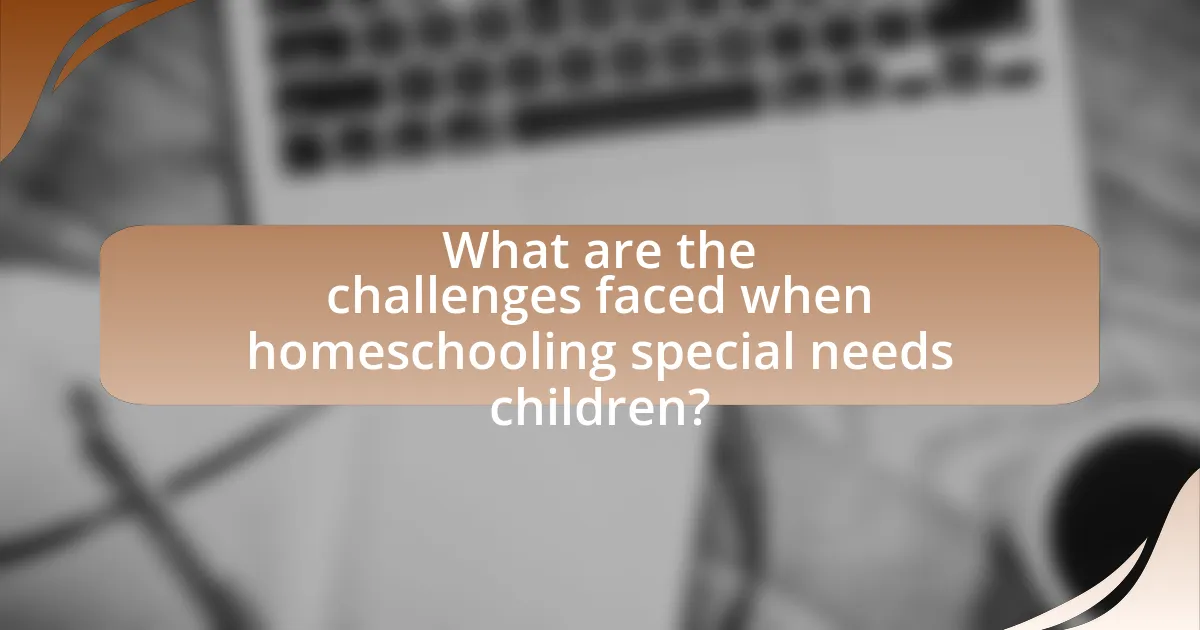
What are the challenges faced when homeschooling special needs children?
Homeschooling special needs children presents several challenges, including the need for individualized instruction, access to appropriate resources, and managing behavioral issues. Individualized instruction is crucial as special needs children often require tailored educational approaches to meet their unique learning styles and needs. Access to appropriate resources, such as specialized curricula and support services, can be limited, making it difficult for parents to provide an effective learning environment. Additionally, managing behavioral issues can be challenging, as some special needs children may exhibit difficulties with focus, social interactions, or emotional regulation, which can disrupt the learning process. These challenges necessitate careful planning and support to ensure successful homeschooling experiences for special needs children.
How can parents address socialization concerns for their children?
Parents can address socialization concerns for their children by actively facilitating opportunities for interaction with peers. Engaging in community activities, such as sports teams, art classes, or local clubs, allows children to meet others and develop social skills. Research indicates that children with special needs benefit significantly from structured social interactions, as these experiences can enhance their communication abilities and emotional understanding. For instance, a study published in the Journal of Autism and Developmental Disorders found that participation in group activities improved social skills in children with autism. Therefore, by providing diverse social experiences, parents can effectively support their children’s social development.
What opportunities exist for special needs children to interact with peers?
Special needs children can interact with peers through inclusive extracurricular activities, social skills groups, and community programs designed for diverse abilities. These opportunities allow children to engage in shared interests, fostering friendships and social development. For instance, inclusive sports teams and art classes provide environments where children can collaborate and communicate with peers, enhancing their social skills. Research indicates that participation in such activities significantly improves social interactions and emotional well-being among children with special needs, as highlighted in studies by the National Center for Learning Disabilities.
How can parents facilitate community involvement?
Parents can facilitate community involvement by actively engaging their children in local events and organizations. By participating in community service projects, attending local meetings, and joining support groups, parents can model civic responsibility and encourage their children to connect with others. Research indicates that children who are involved in community activities develop stronger social skills and a sense of belonging, which is particularly beneficial for special needs children. For instance, a study published in the Journal of Community Psychology found that youth involvement in community service enhances their self-esteem and social competence.
What are common emotional and behavioral challenges in homeschooling special needs children?
Common emotional and behavioral challenges in homeschooling special needs children include anxiety, frustration, and difficulty with social interactions. These challenges often arise due to the unique learning needs of special needs children, which can lead to feelings of isolation and overwhelm when traditional educational structures are absent. Research indicates that approximately 40% of children with special needs experience anxiety disorders, which can manifest as avoidance behaviors during homeschooling. Additionally, behavioral issues such as meltdowns or aggression may occur when children struggle to adapt to the homeschooling environment or when their educational needs are not met effectively. Understanding these challenges is crucial for parents to implement strategies that support emotional regulation and positive behavior management in a homeschooling setting.
How can parents manage frustration and anxiety during learning sessions?
Parents can manage frustration and anxiety during learning sessions by implementing structured routines and incorporating breaks. Establishing a consistent schedule helps create a sense of predictability, which can reduce anxiety for both parents and children. Research indicates that children with special needs often thrive in environments where they know what to expect, as it minimizes stress and enhances focus. Additionally, integrating short breaks allows for mental rest, which can alleviate frustration and improve overall engagement. According to a study published in the Journal of Special Education, structured learning environments significantly enhance the learning experience for children with special needs, leading to better emotional regulation and reduced anxiety levels.
What techniques can help in promoting positive behavior?
Techniques that can help in promoting positive behavior include positive reinforcement, structured routines, and social skills training. Positive reinforcement, such as praise or rewards for desired behaviors, encourages repetition of those behaviors. Structured routines provide predictability, which can reduce anxiety and improve compliance among special needs children. Social skills training helps children learn appropriate interactions, fostering better relationships and reducing behavioral issues. Research indicates that these techniques are effective in improving behavior in children with special needs, as evidenced by studies showing increased engagement and reduced disruptive behaviors when these strategies are implemented consistently.
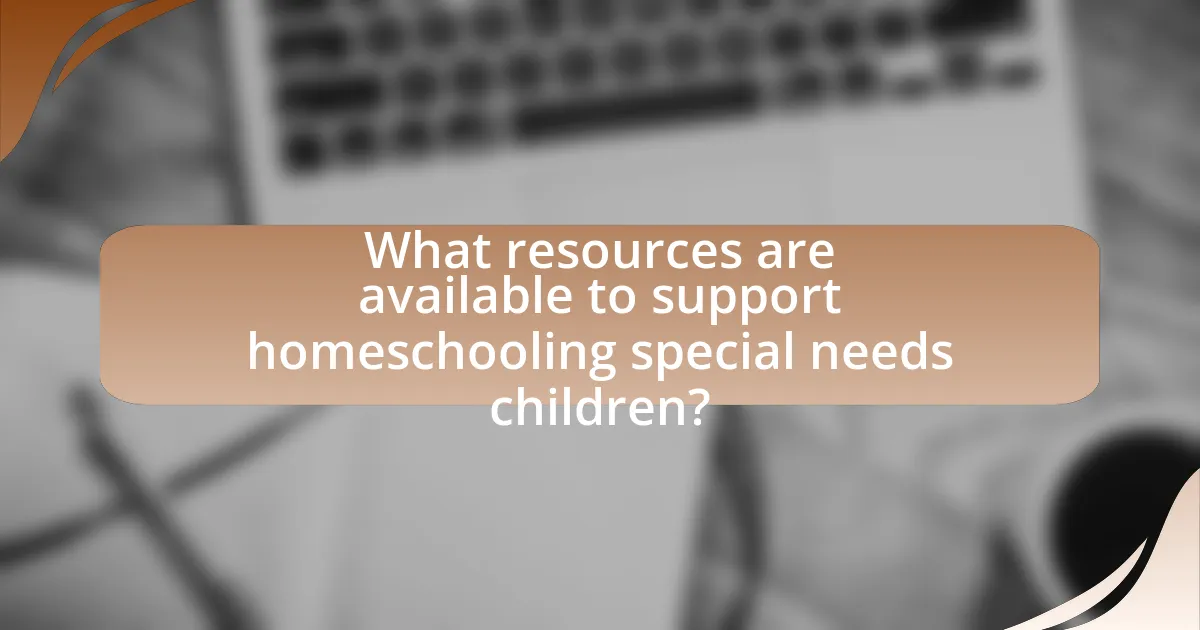
What resources are available to support homeschooling special needs children?
Various resources are available to support homeschooling special needs children, including specialized curricula, online learning platforms, and community support groups. Specialized curricula, such as those from the National Center for Learning Disabilities, provide tailored educational materials that cater to different learning styles and needs. Online platforms like Khan Academy and IXL offer adaptive learning experiences that can be customized for individual progress. Additionally, community support groups, such as local homeschooling co-ops and organizations like the Homeschool Legal Defense Association, provide networking opportunities, resources, and guidance for parents navigating the homeschooling process for special needs children. These resources collectively enhance the educational experience and ensure that children receive the support they require.
How can parents find local and online support groups?
Parents can find local and online support groups by utilizing community resources and online platforms. Local support groups can be discovered through schools, community centers, or organizations focused on special needs education, such as the National Parent Teacher Association or local chapters of advocacy groups. Online support groups are accessible through social media platforms, forums like Reddit, or websites dedicated to special needs parenting, such as Understood.org, which offers a directory of resources. These methods provide parents with valuable connections and shared experiences, enhancing their support network.
What benefits do support groups offer to homeschooling families?
Support groups offer homeschooling families emotional support, practical resources, and a sense of community. These groups provide a platform for parents to share experiences, strategies, and challenges, which can be particularly beneficial for those homeschooling special needs children. Research indicates that participation in support groups can lead to increased confidence and reduced feelings of isolation among homeschooling parents, enhancing their overall educational experience. Additionally, support groups often organize events, workshops, and access to expert advice, which can further aid families in navigating the complexities of homeschooling special needs children effectively.
How can online resources enhance the homeschooling experience?
Online resources can significantly enhance the homeschooling experience by providing access to diverse educational materials tailored to individual learning needs. These resources include interactive lessons, video tutorials, and specialized curricula designed for various learning styles, which can be particularly beneficial for special needs children. For instance, platforms like Khan Academy and IXL offer personalized learning paths that adapt to a child’s pace, ensuring that concepts are mastered before moving on. Additionally, online communities and forums allow parents to connect with other homeschooling families, share strategies, and access support, which can improve both teaching effectiveness and student engagement. Research indicates that the use of technology in education can lead to improved academic outcomes, particularly for students with learning differences, as it allows for a more customized and flexible learning environment.
What role do professionals play in supporting homeschooling special needs children?
Professionals play a crucial role in supporting homeschooling special needs children by providing specialized knowledge, resources, and tailored strategies that address individual learning needs. These professionals, including special education teachers, therapists, and educational consultants, offer assessments to identify specific challenges and strengths, which inform personalized educational plans. For instance, a study published in the Journal of Special Education Technology highlights that collaboration with occupational therapists can enhance motor skills development in children with disabilities, thereby improving their overall learning experience. Additionally, professionals can assist parents in implementing effective teaching methods and adapting curricula to ensure that educational goals are met, ultimately fostering a supportive learning environment for special needs children.
How can parents collaborate with therapists and educators?
Parents can collaborate with therapists and educators by establishing open lines of communication and actively participating in the development of individualized education plans (IEPs). This collaboration ensures that parents are informed about their child’s progress and can provide valuable insights regarding their child’s needs and behaviors at home. Research indicates that effective collaboration between parents and educators leads to improved educational outcomes for children with special needs, as highlighted in the study “The Role of Parents in the Education of Children with Special Needs” published in the Journal of Special Education. This study emphasizes that when parents engage in regular meetings and share observations with therapists and educators, it fosters a supportive environment that enhances the child’s learning experience.
What types of professional services are beneficial for special needs children?
Professional services beneficial for special needs children include speech therapy, occupational therapy, physical therapy, behavioral therapy, and special education services. Speech therapy assists in improving communication skills, which is crucial for social interaction and academic success. Occupational therapy focuses on enhancing daily living skills and sensory integration, enabling children to participate more fully in their environments. Physical therapy helps improve motor skills and physical functioning, which can be essential for mobility and overall health. Behavioral therapy addresses specific behavioral challenges, promoting positive behavior and coping strategies. Special education services provide tailored educational support, ensuring that children receive individualized instruction that meets their unique learning needs. These services collectively support the development and well-being of special needs children, facilitating their growth in various aspects of life.
What are the best practices for evaluating progress in homeschooling special needs children?
The best practices for evaluating progress in homeschooling special needs children include setting clear, measurable goals, using a variety of assessment methods, and maintaining consistent documentation of progress. Clear, measurable goals provide a framework for what the child should achieve, allowing for targeted instruction. Utilizing diverse assessment methods, such as standardized tests, observational assessments, and portfolio reviews, ensures a comprehensive understanding of the child’s abilities and challenges. Consistent documentation, including regular progress reports and learning logs, helps track advancements over time and informs instructional adjustments. Research indicates that individualized assessments tailored to the child’s unique needs lead to more effective educational outcomes, as highlighted in the National Center for Learning Disabilities’ report on effective practices in special education.
How can parents set measurable goals for their children?
Parents can set measurable goals for their children by using the SMART criteria, which stands for Specific, Measurable, Achievable, Relevant, and Time-bound. This framework helps parents define clear objectives that can be tracked over time. For example, instead of a vague goal like “improve reading skills,” a measurable goal would be “increase reading level by one grade within six months.” Research indicates that setting specific and measurable goals enhances motivation and accountability, leading to better educational outcomes for children, particularly those with special needs. A study published in the Journal of Special Education found that students with clearly defined goals showed significant improvement in academic performance compared to those without such goals.
What methods can be used to track and assess learning outcomes?
Methods to track and assess learning outcomes include formative assessments, summative assessments, observational assessments, and portfolio assessments. Formative assessments, such as quizzes and informal checks for understanding, provide ongoing feedback during the learning process, allowing for adjustments in teaching strategies. Summative assessments, like standardized tests or final projects, evaluate student learning at the end of an instructional unit. Observational assessments involve monitoring student behavior and engagement during activities, which can provide insights into their understanding and skills. Portfolio assessments compile a student’s work over time, showcasing their progress and achievements. These methods are supported by educational research indicating that diverse assessment strategies enhance understanding and retention of knowledge in learners, particularly in special needs education.
What practical tips can enhance the homeschooling experience for special needs children?
To enhance the homeschooling experience for special needs children, parents should implement individualized learning plans tailored to each child’s unique needs. These plans should include specific goals, preferred learning styles, and accommodations that address any challenges the child may face. Research indicates that personalized education approaches significantly improve engagement and learning outcomes for special needs students, as highlighted in a study by the National Center for Learning Disabilities, which found that individualized instruction leads to better academic performance and social skills development. Additionally, incorporating sensory breaks, using visual aids, and establishing a consistent routine can further support the child’s learning process and emotional well-being.

